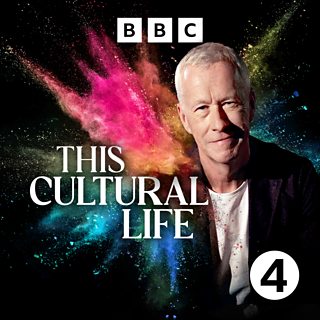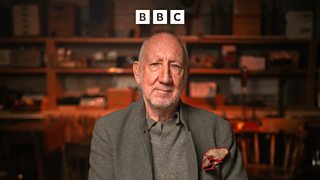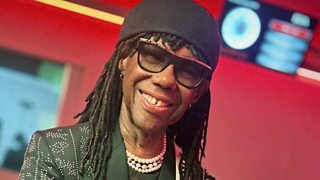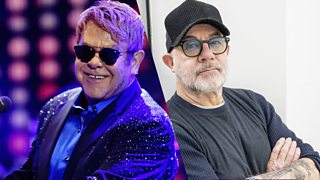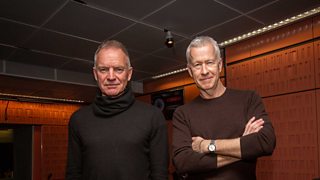Pete Townshend: Seven things we learned from his This Cultural Life interview
As guitarist and principal songwriter for The Who, Pete Townshend is responsible for some of the biggest songs in rock. He’s been inducted into the Rock and Roll Hall of Fame and received lifetime achievement awards from the Brits, the Grammys and the Ivor Novello Awards.
On This Cultural Life, Townshend tells John Wilson about life on the road from an early age; why he hoped The Who would be over in six months; and why, at 80, he’s ready to try new things. Here are seven things we learned.
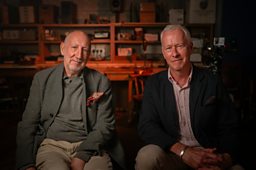
1. He was already touring when he was a child
Pete Townshend was born in London in 1945, into a very musical family. His mother was a singer and his father was a saxophonist with a jazz band called The Squadronaires.
One day I was playing the piano, just clunking away, and I went off into a dream, a fantasy.Pete Townshend
“They were very famous and very popular,” he says, and they always took him on the road. “From about 13 months old, I’ve got an extraordinarily clear memory of many big events, like being on the band bus and passing out beers to trumpet players.”
It was at the age of about 11 or 12 that he started to think about being a musician himself, in part thanks to his aunt Trilby, who’d let him play her out-of-tune piano. “One day I was playing the piano, just clunking away, and I went off into a dream, a fantasy. I could literally hear the most incredible music… She said, ‘That’s very nice, Pete’. I said, ‘I know’.”
2. Rock ‘n’ roll put him in conflict with his dad
Aged 16, Townshend was invited to play rhythm guitar in Roger Daltrey’s band, then called The Detours, along with John Entwhistle. “For me, it was a game, a hobby,” he says. “It was nothing to be serious about.” Townshend thought he’d become a visual artist, not a musician.
His dad never approved of his music. He wouldn’t accept that rock ‘n’ roll was becoming dominant, overtaking jazz. “Three lads with big amplifiers, we could make the equivalent noise of a 20-piece dance band [like his father’s]… I often say, with pride and bombast, that I drew the line with My Generation.” With that song he provided an anthem for post-war kids who wanted to do things their way.
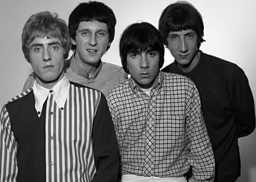
3. He hoped The Who would only last six months
At school, in 1963, Townshend wrote a manifesto for himself. “Whatever I did with the band would last six months,” he says. “It was a punk manifesto.” He saw himself moving on to do other artistic things. He regarded – and still regards – The Who as an art project, a place to experiment and try out ideas, more than just a commercial band. “The difficult thing is that the other three members – and Roger still today – didn’t and don’t.” He says Roger Daltrey would “spend most of his time laughing” if he heard the way Townshend talks about his work on This Cultural Life.
On stage, I became somebody I daresay that I’m not... I would prefer not to be that person.Pete Townshend
Everything changed for him the first time he heard their song Can’t Explain on the radio. “I thought, my manifesto is not going to work. I’m not going to get past this. I want this band to stop. I badly, badly don’t want it to last the rest of my life… Hearing that record on the radio, the creative in me thought, ‘wow, people are listening to this’”. And the rest is history.
4. On stage, he becomes someone he doesn’t know
Speaking to John Wilson, Townshend sounds calm and mild-mannered. On stage, he’s known for smashing guitars. “On stage, I became somebody I daresay that I’m not,” he says. “I would prefer not to be that person. I don’t know who that person is. I don’t know how I do it. I don’t know if I do it well. I don’t know if I’m acting or whether it’s real. I just don’t know who it is.”
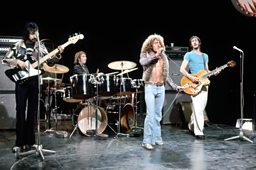
5. He doesn’t have good memories of Woodstock
We were supposed to go on at nine o’clock at night... but we went on at three or four in the morning.Pete Townshend
In 1969, The Who were the penultimate act on the Saturday night of Woodstock, arguably the single most famous music event in history. “We were supposed to go on at nine o’clock at night, but we were delayed and delayed and went on at three or four in the morning,” he says. It led to one of the band’s defining moments, as they played See Me Feel Me, the last song from the album Tommy, as the sun came up.
But Townshend says “I don’t have good memories of Woodstock, I’m afraid… The main thing was that it ended up being very, very badly organised. Obviously the film of it was a big success. It helped bring Tommy back. It helped bring The Who back. It helped make the careers of a lot of fabulous bands.”
6. The future of The Who is uncertain
“I reserve the right to stop,” says Townshend of The Who, “and I have stopped, of course, twice. Once for 11 years.” The band will be heading on a farewell tour of the US soon, but Townshend isn’t sure if they’ll ever perform anywhere else again. “I think Roger holds the cards now,” he says of who’ll make that decision.
If he is finished with The Who, Townshend knows which song he’d like to be remembered for. “Love, Reign o'er Me [from the film Quadrophenia]. I don’t know why. I just like it.”
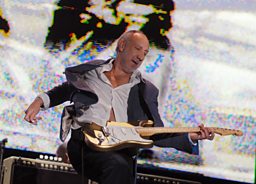
7. At 80, he’s not to old to try new things
Townsend has just turned 80. Asked if he feels old, he says, “No, I’ve just got a new knee.” As he enters his ninth decade, he’s almost written a new manifesto for himself. “I decided, about two years ago, that as I approached the age of 80, I’m going to swerve… I’m going to avoid the [idea] that because one has done something good in the past that you have to keep revisiting… I’m moving into creating art, into producing theatre, into producing ballet, into writing a very serious classical opera. I’m grasping all the attributes I know that I have… I may actually do some dancing when I get my other knee done.”
-
![]()
Pete Townshend: This Cultural Life
Listen to the full interview on ÃÛÑ¿´«Ã½ Sounds.
-
![]()
Nile Rodgers: Nine things we learned from his This Cultural Life interview
The influential musician talks about his core cultural inspirations.
-
![]()
Bernie Taupin: Nine things we learned from his This Cultural Life interview
Elton John's songwriting partner shares his creative inspirations.
-
![]()
Sting: Nine things we learned from his This Cultural Life interview
The Police singer shares his experiences and influences that shaped a songwriting career.
